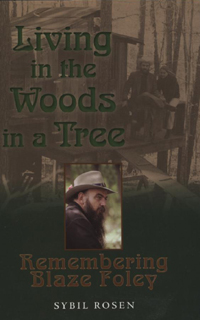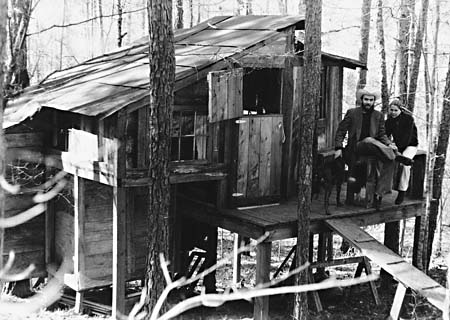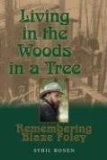On Dec. 28, 1988, Blaze Foley took the stage at the Austin Outhouse, one of the few bars left in town that would still allow him to play. His beard was long and scraggly, grazing the top of his borrowed guitar. His voice was gruff and slurring, conceding to too many drinks. Behind the boards, his friend Lost John Casner sat taping the show, securing the set as one of few recordings that remain of Foley. It would be one of his final performances. Less than five weeks later, Foley was shot and killed.
On that rainy Wednesday night, Foley seemed lost in his alcohol haze, playfully and poignantly reeling through memories preserved in the amber cast of his songs. In an unreleased portion of Casner's recordings, a voice from the crowd can be heard requesting, "Play the first song you ever wrote!"
"I wouldn't even sing that to myself in the dark," Foley replies coyly.
"What was it about?" the requester presses.
"It was about living in a tree house," says Foley. "I lived with a half-black Jewish girl. ... It was called 'Livin' in the Woods in a Tree.'"
If I Could Only Fly
In the spring of 1975, Blaze Foley didn't yet exist. The songwriter whose legacy remains cloaked in local myth was still years away from taking root in Austin. In his place was a tall and trim 25-year-old calling himself "Depty Dawg" and kicking around a small artists' community just outside Whitesburg, Ga.
Sybil Rosen was a 24-year-old aspiring actress, recently graduated from college and returned to her parents' house in Virginia. When a friend invited her to visit the makeshift commune and help establish a theatre at Banning Mill, she jumped on the opportunity for a new adventure.
"I had read about [Depty] in this letter that my friend wrote me, so I was looking for him, in a way, when I got to the Mill," laughs Rosen. "What was so great was to meet him and not be disappointed. We were both really, really shy, so we kind of circled around each other for a while, but I think what was so powerful for me was once I heard him sing and I saw that incredible depth of feeling and his gift. It seemed that there was a certain inevitability to our getting together."
Rosen and Depty became nearly inseparable that summer. Broke but wrapped in the passion and invincibility of young lovers, they took to a small wooden shelter deep in the pine forest of a friend's nearby property. They made the tree house into a home, food and beer kept cool in a nearby stream. The hideout was dubbed "Udo," and the two existed in a state of willful bliss. Big artistic dreams were balanced with the restive contentedness of carefree midnight whispers. Depty soon began writing his own songs and talked of becoming a legend. He decided one day he would perform under the name "Blaze Foley."
"Aside from the tree house, which was such an incredible opportunity to share and so romantic and adventurous, we were also surrounded by this community that was just so generous to us," attests Rosen. "Those friendships really allowed us to nest down into each other in a way that wasn't fraught, so we both had this experience of eight months of happiness."
By the next year, the couple decided that if Foley was going to pursue his songwriting, they should be in Austin. They hitchhiked across the South and arrived that May, but life in the city soon brought its pressures to bear on their relationship.
"I think that we went to Austin with so much expectation of what was going to happen and how fast it was going to happen," admits Rosen. "But in Austin the stakes were so high for him because it was about the success of his career and validation as a musician, and it was scary. So there were a lot of things for us to grapple with, because we had come from this bucolic, sustained happiness, and suddenly it got much more complicated.
"And one of the things that complicated it was because it was a bar scene and the way that Depty felt there was a certain behavior expected of him to be that wild, crazy drunken guy, and perhaps he was right.
"For me it was a whole other experience. I was on my own."
Their stay in Austin was brief. Though they returned to Georgia that July, the singer soon decided he needed to hone his talent on the road. The couple eventually decided Chicago might be a less intimidating scene and moved there in November 1976, but the rambling, drinking Blaze Foley had already supplanted the Depty Dawg with whom Rosen fell in love.
In March, Foley returned to Rosen in Chicago, but they recognized they were slipping apart. Rosen was settling into a life of her own, and the legend Foley hoped to forge lay somewhere beyond their relationship. There were no definitive goodbyes, only a song before he left. Sitting on the edge of the bed, tears in both their eyes, he offered a final tune to break their hearts: "If I Could Only Fly."
Picture Cards Can't Picture You
Foley's life has become so obfuscated by his legend that even his close friends knew little of his life before. Rosen, meanwhile, was equally unaware of his reputation spawned since the years they shared together. She didn't know his songs had been recorded by Merle Haggard, Willie Nelson, and John Prine or the praise he had achieved in Austin and around the world. Their relationship was buried in the bruised disconnect of time.
In 2002, local filmmaker Kevin Triplett, whose documentary on Foley has long been in production, finally found Rosen living in the Catskill Mountains in upstate New York, an award-winning screenwriter and playwright grappling with ghosts both recognized and repressed.
She had heard of Foley's death in 1989 but had never resolved his memory or the ultimate disillusion of their relationship. Triplett's unexpected contact finally forced her to reconcile his still-substantial pull in her life, and her new memoir is a beautifully wrought waltz with memory and longing, love and loss.
"As painful as it was to come back to those places where I felt like I had abandoned him in my heart, asking myself all those what-ifs that can really plague you and pursue you in the wee small hours of the night, all of that was extremely hard because it was so big and because I felt a certain amount of guilt and a tremendous amount of regret," she says.
"When I sat down to write, I felt like the only way I could make real peace with Blaze's memory was to be as honest as I could about who I was in that relationship. I just feel so incredibly lucky that I got to know him at the time of his life that I did."
Sybil Rosen will be signing her book in the Texas A&M University Press Consortium Tent at the Capitol on Saturday, Nov. 1, 1-3pm.









